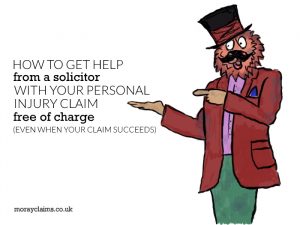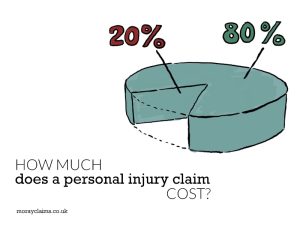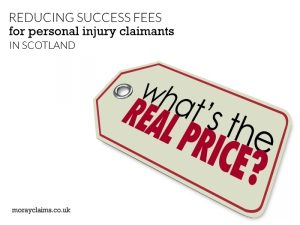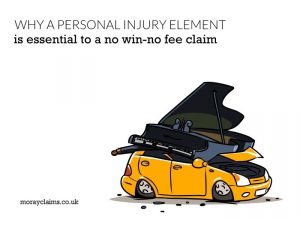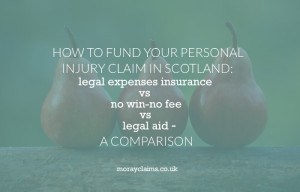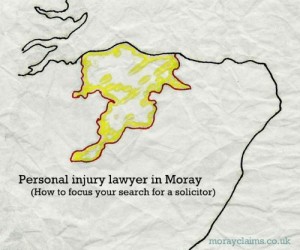It’s natural to be suspicious if someone seems to be offering you something valuable in return for nothing. We are all conditioned to think that if something sounds “too good to be true”, then it must in fact be too good to be true. There are times when we’re vulnerable to letting our guard down – for example, if it’s something we really want – and system tools have evolved to provide some protection. For example, many spam filters will catch emails with “free” in the subject line because use of that one word alone indicates dodgy intentions on the part of the sender. But just because a service is offered as 'provided free of charge' to you, it's not necessarily dodgy as long as the service provider is getting by some other method - such as happens with solicitors working for claimants with personal injury claims. We invite people to ask us questions via our Google Business page. You can ask a question of Moray Claims on Google Business here. You can see the questions Continue Reading
How Does Your Personal Injury Solicitor Make Money If They Do Not Charge You Anything?
One of my favourite rock bands is the Canadian trio, Rush. I have seen them live in concert 5 times between 1981 and 2013. They were inducted into the Rock ‘n’ Roll Hall of Fame in 2013, having released their first album as long ago as 1974. By 1976, Rush were about to release their fourth album. Their previous LPs had been relative commercial failures. And so their record label encouraged them to ditch the ‘concept album’ format – with whole sides devoted to a single theme or story – which they had followed for albums 2 and 3. In fact, they stuck to their philosophy. Side 1 has the 7-part suite of the album’s title, set in a musically intolerant world, now less than 100 years in the future. 2112 (“Twenty-one Twelve”) went on to become arguably their most famous record; it was certainly their breakthrough. The final track on Side 2 is called ‘Something for Nothing’ and has the chorus: You don't get something for nothing You don't get freedom for free You won't get Continue Reading
How Much Does A Personal Injury Claim Cost?
Your solicitor’s aim is to maximise the amount of compensation you receive for your injuries and other losses. The “top line” value of your claim needs to be as high as possible, but that’s not all. You also want to try to reduce the amount you will lose in having to pay legal fees from your compensation. For most people who become a personal injury client of Moray Claims / Grigor & Young, you will lose 10 per cent of your compensation in paying what is called a "Success Fee". In a minority of cases, though, no deduction will apply at all. The basic difference is between claims covered by legal aid (no deduction ever) and claims we deal with on a no win-no fee basis (10 per cent deduction in most cases and, rarely, 20 per cent). So , how much does a personal injury claim cost? And how can you minimise what you will have to pay out of your damages? As we will see, it can mean the difference between receiving 100% of your compensation and only 80% - and the Continue Reading
Why it is best to get your choice of personal injury solicitor right first time
Filmmakers have a wide variety of camera techniques at their disposal to help them tell their story to best effect. One of the most powerful tools directors can employ is the split diopter lens, which makes it possible to have two subjects at different distances in the frame simultaneously – and both in focus. In his 1951 film, Strangers on a Train, Alfred Hitchcock wanted a telephone to be in a foreground close-up while actors in the background remained in focus. This was to emphasise the importance of the incoming phone call. The limitations of camera lenses at the time meant he could not make it work. He fixed the problem by having a giant phone in the foreground and putting a regular-sized phone in Ruth Roman’s hand as she came to answer it. The camera view tilted up as she approached (moving the monster phone out of shot). The 1984 film comedy, Top Secret, spoofed that set-up, with the foreground telephone remaining in shot throughout and the army officer Continue Reading
Reducing Success Fees paid by Scottish personal injury claimants
Success fees are the “hidden cost” of personal injury claims. They reduce the amount of compensation you receive from a personal injury claim after that compensation figure has been fixed and paid. Success fees are fees that are paid out of compensation (awarded or agreed) by successful personal injury claimants to their solicitors or claims management companies under a success fee agreement. In this article, we will look at how the Scottish Government wishes to regulate the maximum levels of success fee that can be charged – to provide a better financial outcome for injured people than they often get at present. First of all, in order to understand the context in which this is all happening, we need to look at wider changes that will soon affect Scottish personal injury claims. The Scottish Government intends to change the way personal injury claims are run in Scotland. This follows similar changes brought in in England and Wales. One big proposed change is to reduce Continue Reading
Why a personal injury element is essential to a no win-no fee claim
Or, to put it another way, why don’t pure property damage claims work no win no fee? Dealing with motor insurers can be a frustrating process. This article was prompted by a question via the Grigor & Young website. The person making the enquiry said of their dealings with the third party insurers: It is an ‘online’ process and one is left for long periods of time on the telephone (twice my phone has run out of power from being fully charged) while trying to get a response. The enquirer had been involved in a road traffic accident that was not their fault. Their car was damaged and needed repairs. The car belonged to one of their parents. They were insured to drive the parent’s car through their comprehensive insurance on their own car. Ordinarily, in a “comprehensive” scenario, you may well choose to claim under your own policy (even if the accident was not your fault) because you have a contract with your insurers. You have more control. You have more clout if Continue Reading
FAQs about After the Event Insurance and Speculative Fee Agreements
Given the way we deal with personal injury claims on a ‘no win- no fee’ (or ‘speculative’) basis at Moray Claims / Grigor & Young, we have to have ‘After the Event’ (‘ATE’) insurance in place. ATE insurance is “after the event” in the sense that your accident was the “event”. If you did not have any ‘Before the Event’ insurance in place (e.g. legal expenses insurance included as part of your house contents insurance) and you do not qualify for legal aid, we need to find another way to insure against the risk that your claim will be unsuccessful and a court makes an award of costs/expenses against you. ATE insurance insures against that risk of adverse costs. In this article, we will consider three questions related to ATE insurance and the speculative fees agreement we get you to sign in conjunction with the ATE insurance. Continue Reading
A Comparison Of Personal Injury Claim Funding Methods: No Win-No Fee vs Legal Aid vs Legal Expenses Insurance
In theory, you could run your Personal Injury Claim on a private fee-paying basis. You would have to pay your solicitor interim fees as the case progressed. You would have to pay for all outlays, including recovery of medical records and payment of expert witness fees. If your case went to Court, you would have to bear a hefty risk. Lose your case and you will not only have to pay the fees and outlays of your own solicitor; you will also be responsible for paying the fees and outlays of the opposing solicitor. Depending upon the complexity of the case and which Court any action is raised in, your legal bill would certainly be thousands of pounds and might be tens of thousands of pounds. Unless you have bottomless financial resources (in much the way that insurance companies do) private fee paying arrangements for personal injury claims are generally reckoned to be “a bad idea”. You need to be able to run your claim in a way which costs a lot less and carries a lot less Continue Reading
Personal Injury Lawyer In Moray (How To Focus Your Search For A Solicitor)
If you live in Moray or have been injured in an accident which happened in Moray, here are some factors to consider if you need to choose a solicitor to help you with a personal injury claim. Are you going to use a local solicitor or one who is at a distance from you? A Moray solicitor will have local knowledge, which could be useful and give them an advantage over someone who is not based in the area. For some types of accident - for example, pavement tripping accidents - it can be crucial for someone (often, the solicitor!) to visit the locus of the accident as soon as possible after the accident in order to take photographs and make measurements. A local solicitor is going to be better-placed to carry out such work. Or maybe not. Google Streetview and other free online tools mean that a virtual visit to a locus is often possible and this may be sufficient, depending upon the type of accident. So, it may not be essential to have a local solicitor to deal with your Continue Reading
After the Event Insurance (Crucial for No Win–No Fee Personal Injury Claims)
After the Event Insurance is needed to protect you in case you lose your no win-no fee claim After the Event (ATE) insurance is where you take out an insurance policy after a legal problem or dispute has arisen in order to protect you against the risk of having to pay the other side’s legal costs if you lose. Why is this type of insurance important for “no win-no fee” personal injury claims? The difference between winning and losing your claim We have seen how your solicitor will get paid for their work for you on a no win–no fee arrangement if they are successful in getting personal injury compensation for you. It’s one thing to look at a winning scenario but it’s also important to be alive to the possibility that your claim might not succeed. What then? No win–no fee means you won’t have to pay anything to your solicitor for their work, if you lose. However, you could be at risk of having to pay other costs if things don’t work out in your favour. Under no win–no fee, failure Continue Reading
How Your Solicitor Gets Paid No Win-No Fee in Scotland
(EDITOR'S NOTE: Some of the content of this article has been superceded. The Voluntary Pre-action Protocol referred to is now a Compulsory Protocol (from November 2016) but we have left this article in place because it provides a useful reference point back to the previous system for comparision purposes). If your solicitor takes on your personal injury claim no win – no fee then it means you will have nothing to pay if the claim does not succeed. But how does the solicitor get paid if the claim is successful and you receive compensation for your injuries and other losses? Your solicitor will have a written agreement with you about how fees are to be calculated if you win your case. This is called a Speculative Fee Agreement. Often, it will provide for charges at an hourly rate and it may even cover what is known as a “success fee”. This is an additional percentage that can be charged to the hourly rate in certain circumstances – usually if the claim was higher risk or more Continue Reading
